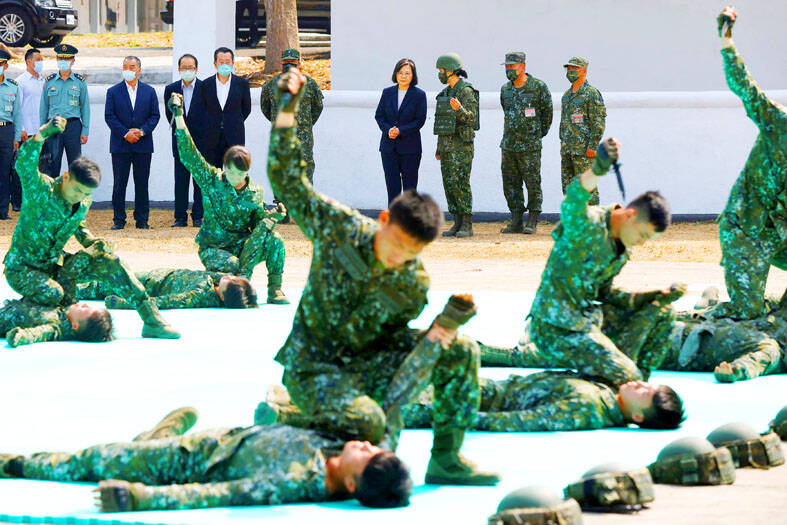President Tsai Ing-wen (蔡英文) yesterday visited army engineers and reviewed their training, saying that defending democracy is the armed forces’ “great” mission, ahead of a trip next week to the US and Central America.
Visiting an army base in Chiayi County, Tsai reviewed their training, watching them erect anti-tank barriers and practice martial arts.
“Protecting Taiwan and defending democracy has always been our military’s great mission,” she told the soldiers, accompanied by Minister of National Defense Chiu Kuo-cheng (邱國正) and National Security Council Secretary-General Wellington Koo (顧立雄).

Photo: Carlos Garcia Rawlins, Reuters
“I believe that only by continuously training and strengthening the military’s war preparedness can we be even more able to protect our home and defend our country,” Tsai added.
She is making a high-profile trip to the US and Central America starting on Wednesday.
China has condemned the US for allowing her to go, although her visit there is technically only a transit.
At the end of the trip, Tsai is expected to meet US House of Representatives Speaker Kevin McCarthy in Los Angeles.
China staged war games near Taiwan in August last year after then-US House of Representatives speaker Nancy Pelosi visited Taipei.

TRAGEDY STRIKES TAIPEI: The suspect died after falling off a building after he threw smoke grenades into Taipei Main Station and went on a killing spree in Zhongshan A 27-year-old suspect allegedly threw smoke grenades in Taipei Main Station and then proceeded to Zhongshan MRT Station in a random killing spree that resulted in the death of the suspect and two other civilians, and seven injured, including one in critical condition, as of press time last night. The suspect, identified as a man surnamed Chang Wen (張文), allegedly began the attack at Taipei Main Station, the Taipei Fire Department said, adding that it received a report at 5:24pm that smoke grenades had been thrown in the station. One man in his 50s was rushed to hospital after a cardiac arrest

SAFETY FIRST: Double the number of police were deployed at the Taipei Marathon, while other cities released plans to bolster public event safety Authorities across Taiwan have stepped up security measures ahead of Christmas and New Year events, following a knife and smoke bomb attack in Taipei on Friday that left four people dead and 11 injured. In a bid to prevent potential copycat incidents, police deployments have been expanded for large gatherings, transport hubs, and other crowded public spaces, according to official statements from police and city authorities. Taipei Mayor Chiang Wan-an (蔣萬安) said the city has “comprehensively raised security readiness” in crowded areas, increased police deployments with armed officers, and intensified patrols during weekends and nighttime hours. For large-scale events, security checkpoints and explosives

PUBLIC SAFETY: The premier said that security would be tightened in transport hubs, while President Lai commended the public for their bravery The government is to deploy more police, including rapid response units, in crowded public areas to ensure a swift response to any threats, President William Lai (賴清德) said yesterday after a knife attack killed three people and injured 11 in Taipei the previous day. Lai made the remarks following a briefing by the National Police Agency on the progress of the investigation, saying that the attack underscored the importance of cooperation in public security between the central and local governments. The attack unfolded in the early evening on Friday around Taipei Main Station’s M7 exit and later near the Taipei MRT’s Zhongshan

A car bomb killed a senior Russian general in southern Moscow yesterday morning, the latest high-profile army figure to be blown up in a blast that came just hours after Russian and Ukrainian delegates held separate talks in Miami on a plan to end the war. Kyiv has not commented on the incident, but Russian investigators said they were probing whether the blast was “linked” to “Ukrainian special forces.” The attack was similar to other assassinations of generals and pro-war figures that have either been claimed, or are widely believed to have been orchestrated, by Ukraine. Russian Lieutenant General Fanil Sarvarov, 56, head